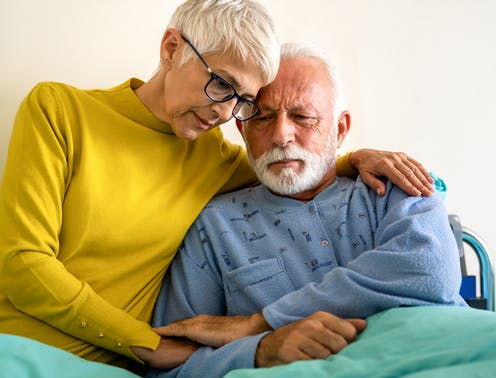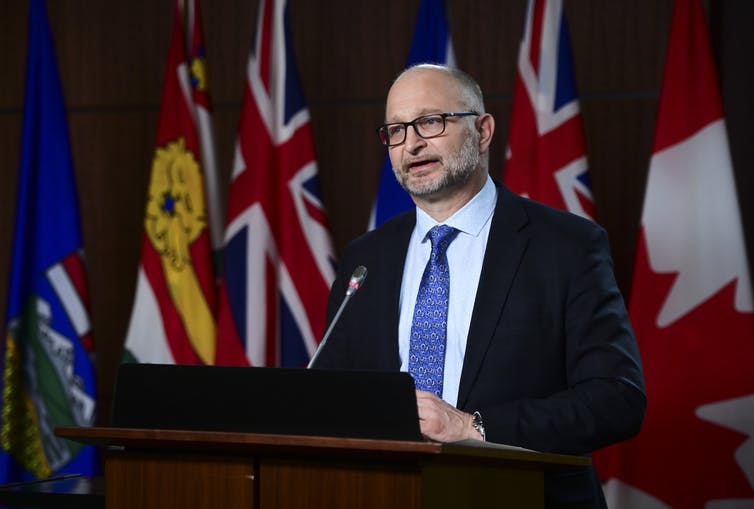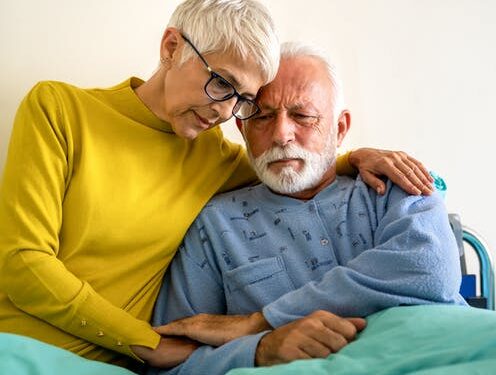
(Shutterstock)
Medical assistance in dying (MAID) was legalized in Canada in 2016. Since then, there have been year-over-year increases in Canadians accessing a MAID death. The most recent data from 2019 to 2020 highlights a 34.2 per cent increase in Canadians accessing MAID.
Bill C-7, which passed in June 2021, changed the eligibility criteria by removing the “natural death has become reasonably foreseeable” requirement. As a result, more Canadians may qualify for MAID.
During the pandemic, 23 per cent of care providers in an international survey reported that assisted death inquiries or requests had “somewhat” or “significantly” increased. MAID and COVID-19 pressures resulted in at least one Canadian province temporarily pausing referrals for patients wishing to access MAID.
Table of Contents
Non-participation in MAID:
Health-care providers willing to participate in patient assessment and MAID provision are essential to support Canadians who wish to access MAID. That makes it important to understand the factors that influence practitioners’ decisions to not participate in MAID.

THE CANADIAN PRESS/Sean Kilpatrick
As an end-of-life researcher and registered nurse, I investigated this question with the support of my thesis committee. That research highlighted the complex and interwoven reasons why health-care practioners may not participate in MAID.
These factors can be divided into internal and external factors, but it’s also important to recognize that there are conscience and non-conscience-based factors that influence non-participation.
Internal factors
Several personal, or internally originating, factors influenced non-participation. These included a general discomfort in caring for dying patients as well as the provider’s previous personal and work experiences related to death and dying. Also, MAID did not align with some practioners’ approaches to end-of-life care.
Other factors that influenced non-participation included practitioners’ views of their professional duty. MAID did not align with some practitioners’ faith or spiritual beliefs, and some reported they could not imagine being at peace with the decision to participate in medically assisted dying.
Health-care practitioners also considered how they were likely to respond emotionally to participating in MAID. They had concerns about the future impact of MAID participation in terms of their potential risk of post-traumatic stress disorder and burnout.
External factors
-
Health-care system factors: The health-care system influenced non-participation. This included working for an organization with an institutional conscientious objection to MAID and the uncertainty of working within a rapidly changing legal landscape in terms of MAID regulation. There were also concerns about adequate access to alternatives to MAID, such as palliative care and chronic care support at home. Some nurse practitioners reported that they did not participate in MAID because of limiting job or practice descriptions at their current employer or a lack of billing codes that would enable them to be paid for these services.
-
Community factors: Reasons for non-participation also included gauging the “community conscience,” perceiving a lack of openness in end-of-life discussions and the dominant religious beliefs of the community. Health-care practitioners were concerned about the impact of having to reduce or cancel other services in an already busy practice to make the time to provide MAID care to a single patient. They were also unsure if or how culture influenced the patient’s perception of MAID, or the patient’s perception of them as health-care practitioners if they participated or if participation would alter the community’s trust in them.

(Shutterstock)
-
Practice factors:
For some health-care practitioners, their decision to not participate in MAID was influenced by a lack of policy and program knowledge or skills to participate in the MAID assessment or provision. Another reasons was adequate pay for the time and overhead costs involved. Others said they lacked understanding about the optimal care model for MAID (such as whether MAID is provided by family medicine practitioners, end-of-life care practitioners or MAID teams). Others identified that MAID was outside their clinical interest and practice strengths. -
Visibility factors:
How MAID participation would be viewed by colleagues, clinic staff and patients also influenced the non-participation of health-care providers. This included fear of colleagues’ disapproval, fear that participation would harm patient relationships and their relationship with their faith community and a fear that participation would be interpreted as giving up on patients. -
Risk factors:
Health-care providers contemplated the risk to themselves, their practice and their families. Specifically, the risk associated with professional discipline if the patient or patient’s family disagreed with their assessments, the risk of colleagues making their professional lives difficult and the perceived risk of personal physical harm or violence to themselves or their families. -
Time factors:
Concerns about competing clinical demands, time-limited appointments that do not accommodate end-of-life conversations and lack of time to offer quality MAID care influenced non-participation as well. Some health-care providers did not wish to take on new practices at their current career stage (for example, close to retirement) and others noted a lack of time to take continuing education in MAID. -
Patient’s family factors:
Other factors that influenced non-participation in MAID related to the patient’s family. Health-care providers expressed concern that participation would impact the care provided to other family members and that there was a lack of support for the family before, during and after MAID. They also considered the potential challenges of inter-family conflict around the patient’s MAID choice and the impact of the MAID death on future family dynamics. -
Patient relationship factors:
Another factor was the health-care practitioner/patient relationship. A long relationship with the patient could make participating in MAID uncomfortable and challenging. Others noted that a long history with a patient would support open discussions about their reasons for not participating in MAID.
Support for health-care practitioners
My research outlines a model of non-participation in the formal MAID processes. In terms of conscience and non-conscience-based factors, it’s vital to differentiate between a conscientious objection to MAID and non-participation in MAID because health-care practitioners require different support for these.
Steps that might support health-care practitioners who are considering participating in MAID include clarifying regional models of care, which vary between provinces and territories.
Practice-focused MAID education could include not only policy and legal aspects but also pragmatic issues such as obtaining medications and administrative requirements, as well as discussions about relevant factors like communication skills and religious knowledge.
Recognizing the practice issues, time and relationship investment required to provide MAID, and developing fair remuneration policies for health-care practitioners who provide it, may support more participation in MAID.
Supporting health-care practitioners will be vital to a sustainable, healthy health-care system for Canadians.
![]()
Janine Brown has received funding from the Saskatchewan Health Research Foundation, Canadian Association of MAID Assessors and Providers and Dying with Dignity Canada.

























